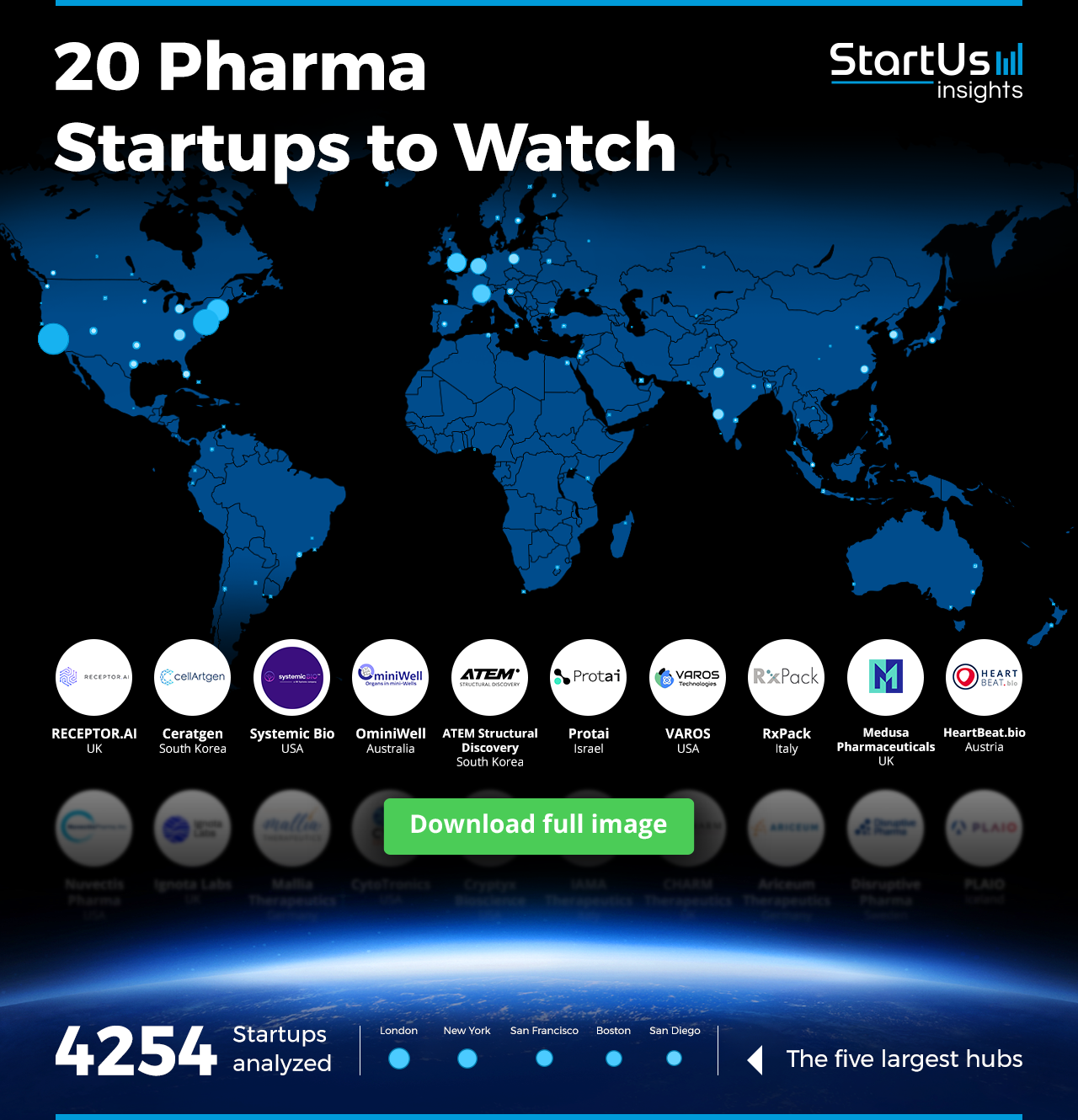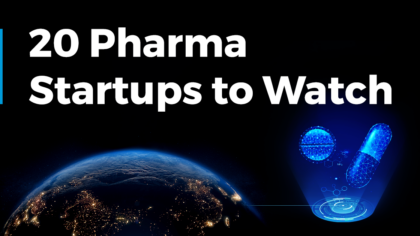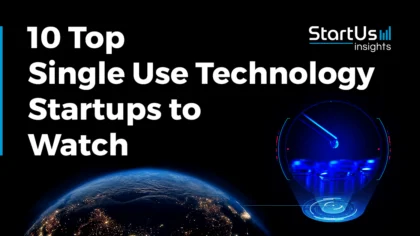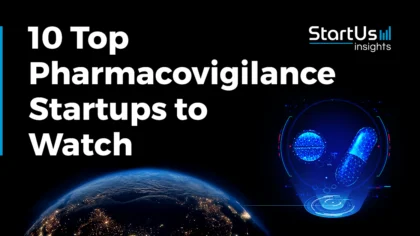Accelerate Productivity in 2025
Reignite Growth Despite the Global Slowdown
The pharmaceutical industry is witnessing a remarkable transformation, driven by the innovation and promise of 20 emerging pharma startups to watch in 2025. This blog post introduces them, each harnessing cutting-edge technologies to revolutionize healthcare. Among their breakthroughs, targeted cancer therapeutics and targeted radiopharmaceuticals are leading the charge in cancer treatment, offering precision and reduced side effects. Advanced hair loss treatment is bringing new hope to millions, while non-destructive live cell analysis is changing the game in cellular research.
The exploration of silent biosynthetic gene clustering is unlocking new potential in drug discovery. The development of mesoporous magnesium carbonate-based drug delivery systems is enhancing drug efficacy, and small molecule inhibitors are opening new therapeutic avenues. Furthermore, solutions for digitalized pharma planning are streamlining the entire pharmaceutical process, from research to market. Join us as we explore how these startups are shaping the future of medicine in the years to come.
This article was last updated in July 2024.
20 Pharma Startups to Watch in 2025
- Nuvectis Pharma – Targeted Cancer Therapeutics
- Mallia Therapeutics – Hair Loss Treatment
- CytoTronics – Non-destructive Live Cell Analysis
- Cryptyx Bioscience – Silent Biosynthetic Gene Clustering
- Ariceum Therapeutics – Targeted Radiopharmaceuticals
- IAMA Therapeutics – Pediatric Neuropsychiatric Disorders
- Disruptive Pharma – Mesoporous Magnesium Carbonate-based Drug Delivery
- Ignota Labs – Drug Safety
- CHARM Therapeutics – Small Molecule Inhibitors
- PLAIO – Digitalized Pharma Planning
- RECEPTOR.AI – Drug Design Platform
- Cellartgen – Organoid Disease Modeling
- Systemic Bio – Hydrogel Bioprinting Platform
- OminiWell – 3D Cell Culture Platform
- ATEM Structural Discovery – Cryogenic Drug Discovery
- Protai – Proteomic Drug Discovery
- VAROS – Immersive Reality Organ Visualization
- RxPack – Easy-To-Use Drug Dispensers
- Medusa Pharmaceuticals – Novel Drug Reinvigoration
- HeartBeat.bio – Cardiovascular Drug Screening
Global Startup Heat Map highlights 20 Pharma Startups to Watch
Through the Big Data & Artificial Intelligence (AI)-powered StartUs Insights Discovery Platform, covering over 4.7M+ startups & scaleups globally, we identified 4254 pharma startups. The Global Startup Heat Map below highlights the 20 pharma startups you should watch in 2025 as well as the geo-distribution of all pharma startups & scaleups we analyzed for this research.

Based on the heat map, we see high startup activity in the USA and Europe, followed by India. These energy startups work on solutions ranging from accelerated drug discovery to targeted cancer therapeutics and biosynthetic gene clustering to novel drugs for pediatric neuropsychiatric disorders.
As the world’s largest resource for data on emerging companies, the SaaS platform enables you to identify relevant technologies and industry trends quickly & exhaustively. Based on the data from the platform, the Top 20 Pharma Startup Hubs are in London, New York, San Francisco, Boston, and San Diego.
The 20 hand-picked startups highlighted in this report are chosen from all over the world and develop solutions for targeted radiopharmaceuticals, non-destructive live cell analysis, silent biosynthetic gene clustering, small molecule inhibitors, and much more.
Explore 20 Innovative Pharma Startups to Watch (2024)
Nuvectis Pharma offers Targeted Cancer Therapeutics

USA-based startup Nuvectis Pharma develops targeted therapeutics for cancer treatment. Its product, NXP800 is an orally bioavailable activator of the GCN2 kinase, which plays a role in stress response pathways in cells. By activating GCN2, NXP800 reduces overall protein synthesis in cancer cells, leading to their death, while sparing normal cells.
The startup’s other product, NXP900, is an oral inhibitor of the SRC/YES1 kinase, which is often overactivated in various solid tumors. This compound inhibits both the catalytic and scaffolding functions of SRC kinase, offering a more comprehensive blockade of this pathway. Unlike traditional multi-kinase inhibitors, NXP900 does not affect the ABL kinase, which may reduce immunosuppression and is advantageous in treating solid tumors.
Mallia Therapeutics advances Hair Loss Treatment

Mallia Therapeutics is a German startup that utilizes soluble CD83 (sCD83) for hair loss treatment. sCD83 is a soluble form of the CD83 human glycoprotein that stimulates the formation of new hair follicles, thus inducing new hair growth. This topical treatment stands out for its safety profile, as sCD83 does not penetrate the skin, eliminating systemic toxicity.
The startup’s preclinical models have demonstrated the efficacy of sCD83 in treating androgenetic alopecia and alopecia areata. Thus, with its product’s anti-inflammatory properties and direct interaction with follicular stem cells, Mallia Therapeutics effectively treats hair loss.
CytoTronics enables Non-destructive Live Cell Analysis

CytoTronics is a USA-based startup that enhances drug discovery through high-throughput live cell screening. Its platform utilizes semiconductor speed and resolution to gather real-time data on live cell functions. This approach allows for screening across various cell types, including epithelial and suspension cells, tailored to any disease.
The non-invasive, label-free technology ensures non-destructive analysis, maintaining cell integrity. The high-dimensional, spatial data acquisition enables the quantification of multiple live-cell biology parameters simultaneously. CytoTronics provides valuable insights by studying cell function in real-time at single-cell resolution. The platform finds applications in toxicology, compound profiling, phenotypic screening, and more.
Cryptyx Bioscience offers Silent Biosynthetic Gene Clustering

USA-based startup Cryptyx Bioscience designs a drug discovery platform, HiTES (High-Throughput Elicitor Screening), that activates silent biosynthetic gene clusters to discover new therapeutics. It enables access to a microbe’s biosynthetic potential. HiTES does not require genetic manipulation, cloning, or culturing procedures for its operation. It works with both sequenced and unsequenced bacteria and reports on the bioactivity of cryptic metabolites. The startup leverages this to develop novel therapies for bacterial and viral infections, with expansion into oncology research.
Cryptyx Bioscience offers partnerships and licensing opportunities for its broad range of biologically active novel metabolites. Additionally, it advances drug leads toward clinical trials, adapting its discovery platform to various disease targets. For biochemical researchers, a metabolite library is available for purchase to use in screening assays. The versatility of HiTES thus allows for its application to any microorganism, enhancing known natural products or inducing new ones.
Ariceum Therapeutics advances Targeted Radiopharmaceuticals

German startup Ariceum Therapeutics develops targeted radiopharmaceuticals for cancer visualization and treatment. The startup designs targeting molecules that bind to specific structures on tumor cells or their DNA. This targeted delivery system minimizes healthy tissue exposure and reduces side effects. Ariceum’s targeting molecules are useful for both diagnostic imaging and therapeutic treatment, depending on the radioisotope used.
The visualization of drug uptake by tumors ensures accurate patient selection for therapeutic radioisotope treatment. The startup’s lead molecule, satoreotide, a proprietary peptide derivative targets the somatostatin 2 receptor on certain tumor types without triggering biological activity. Ariceum also develops PARPi (Poly(ADP-ribose) polymerase inhibitor), targeting activated PARP on tumor DNA, delivering therapeutic radiation with minimal normal tissue impact.
IAMA Therapeutics treats Pediatric Neuropsychiatric Disorders

IAMA Therapeutics is an Italian startup that develops novel medicines for treating brain disorders in children. It develops ARN23746, an inhibitor targeting the Na-K-2Cl Co-transporter-1 (NKCC1). ARN23746 treats a range of neurodevelopmental disorders by modulating NKCC1 activity.
The company designs and synthesizes selective NKCC1 inhibitors for addressing core symptoms in brain conditions like the down syndrome. IAMA Therapeutics also discovers small molecule drug candidates that offer selective inhibition of NKCC1. Further, the startup aims to reverse excitatory GABAAR signaling, which could restore synaptic plasticity and memory.
Disruptive Pharma provides Mesoporous Magnesium Carbonate-based Drug Delivery

Swedish startup Disruptive Pharma develops drug products using its proprietary Mesoporous Magnesium Carbonate (MMC) technology. MMC enhances the solubility and stabilization of amorphous drug substances, offering a high surface area for active ingredient delivery. The technology features a uniform pore size that suppresses crystallization, stabilizing drugs in their amorphous form.
MMC’s particle size is optimized for rapid dissolution and scalability in drug product manufacturing. MMC formulations enhance oral bioavailability, reduce dosages, and improve patient tolerability. The technology also supports the development of new chemical entities, overcoming formulation challenges and reducing development time.
Ignota Labs streamlines Drug Safety

UK-based startup Ignota Labs builds an AI platform, ATLAS (Automated Toxicity Labelling, Analysis, and Screening) to enhance drug safety. It employs Generative AI for compound assessment and optimization. Thus, reducing off-target effects that can impede projects. The platform also features in vivo contextualization — utilizing causal reasoning over a knowledge graph to make toxicity predictions relevant to human clinical outcomes.
The technology includes target deconvolution and a mechanism of toxicity assessment to distinguish between efficacy and toxicity pathways. ATLAS searches through vast algorithmic spaces to identify highly accurate models. It breaks down AI outputs to provide structural and physicochemical analysis of toxicity drivers. This enhances drug discovery decision-making by understanding a compound’s mechanism of action or toxicity. Ignota Labs thus curates high-quality data to build AI models that predict vital safety considerations for early drug discovery.
CHARM Therapeutics makes Small Molecule Inhibitors

UK-based startup CHARM Therapeutics formulates medicines for hard-to-drug disease targets using 3D deep learning technology. The startup’s proprietary DragonFold algorithm predicts protein/ligand co-folding to discover novel small molecule inhibitors.
It progressively updates and refines the fit and takes conformational changes into account, The technology is also capable of unlocking cryptic pockets. CHARM Therapeutics targets cancers and other diseases with high unmet medical needs. The startup thus delivers drugs that target complex proteins involved in various diseases.
PLAIO simplifies Digitalized Pharma Planning

PLAIO is a startup from Iceland that makes a pharma processes planning platform. It enables effective demand and supply planning. With a clear overview of batch/lot sizes per product, the module allows for optimal supply planning, reducing waste, and improving inventory management. The manufacturing planning module provides a visual planner that provides a visual overview of manufacturing stages and lines, enabling planners to easily plan and adjust processes, with instant visual feedback on constraints.
Users are also able to create instant simulations and “what if” scenarios on actual plans to understand and act on unforeseeable events. For purchase planning, PLAIO automates material requirement planning workflows, thus preventing stock-outs and production bottlenecks. Moreover, the startup offers the PLAIO Coplanner, which is an advanced automation feature that employs AI to assist planners in making optimal production decisions in real-time.
Interested in exploring all 4200+ pharma startups & scaleups?
RECEPTOR.AI develops a Drug Design Platform
UK-based startup RECEPTOR.AI offers a software-as-a-service (SaaS) platform for rapid and precise drug design. It features a user-friendly interface and enables automation, planning, and control of all aspects of drug discovery projects. With over 40 AI methodologies, the modular platform architecture makes drug design more flexible and customizable. Receptor.AI’s experimentally-proven platform also integrates biological assays to deliver high-quality medicines.
This enables researchers to generate a virtual chemical space with synthesizable compounds using structure-based AI methodologies and chemical simulation techniques. Further, the platform performs AI-powered virtual screening to determine promising bioactive compounds without requiring ligands as a template. The platform’s scalable hybrid cloud infrastructure thus allows pharma companies to efficiently implement large-scale drug discovery projects.
Cellartgen aids Organoid Disease Modeling
South Korean startup Cellartgen develops organoid disease models. The startup utilizes organoid culture technology to mimic organ-specific bio environments. This allows for the modeling of rare and intractable diseases such as non-alcoholic steatohepatitis (NASH), Alzheimer’s Disease, and pulmonary fibrosis (IPF).
Through the use of organoid co-culture technology, Ceratgen implements in vitro models with the structure and function of multiple organs, including the brain-blood barrier. These multi-organ models allow for the understanding of mechanisms and the discovery of related drugs, all while minimizing clinical costs and time. With this disease modeling approach, the startups provide an efficient platform for patient-specific drug discovery.
Systemic Bio makes a Hydrogel Bioprinting Platform
US-based startup Systemic Bio improves drug discovery with its innovative bioprinting technology. The startup’s platform, h-VIOS, creates vascularized organ models using hydrogels and human cells for preclinical drug testing. It allows for the creation of up to thirty-two vascularized hydrogels in one plate, including primary cells, cell lines, and stem cells.
By integrating vascular networks into the 3D-printed hydrogels, h-VIOS accurately replicates complex human organ architecture, providing more accurate data on drug efficacy and safety. This technology offers several benefits to the pharmaceutical industry, including reduced costs and time required for preclinical testing, and faster identification of drug candidates.
OminiWell develops a 3D Cell Culture Platform
Australian startup OminiWell offers a 3D cell culture platform. It is an extracellular matrix-based (ECM) system that enables pharmaceutical companies to grow microtissues in similar sizes in situ, to evaluate cell-cell and cell-matrix interactions. This technology enables the creation of a 3D cell structure that accurately replicates an individual’s biological system.
Moreover, this provides an ideal platform for the optimization and testing of personalized drug combinations. By growing complex mini-organ tissues in the lab, OminiWell accelerates drug discovery, reducing the need for animal testing and shortening the time to market for new drugs.
ATEM Structural Discovery facilitates Cryogenic Drug Discovery
South Korean startup ATEM Structural Discovery develops cryogenic electron microscopy (cryo-EM) for drug discovery. The startup’s platform leverages artificial intelligence (AI) to provide insights into the molecular structures of target proteins. By visualizing these structures in near-atomic detail, it identifies and optimizes drug candidates that bind with the highest affinity and specificity.
This increases the likelihood of the success of drugs in clinical trials. Unlike traditional drug discovery methods, cryo-EM is less time-consuming, cost-effective, and more accurate. This enables pharma companies to optimize drug discovery processes and bring life-saving therapies to patients faster.
Protai innovates in Proteomic Drug Discovery
Israeli startup Protai offers a proteomics-centered drug discovery platform. It provides a complete disease and modality-agnostic pipeline, from data collection through target identification to drug discovery and development. The technology works by leveraging high-resolution large-scale datasets, such as mass spectrometry proteomics, protein-protein interactions, and different structural populations of proteins.
By using ML algorithms, the startup precisely discovers and characterizes modulators that reshape the outcome of complex diseases. The platform also utilizes data across a variety of therapeutic agents. This makes it easier for pharmaceutical firms to discover more effective drugs.
VAROS advances Immersive Reality Organ Visualization
VAROS is a US-based startup working on patient education with its immersive reality mobile application. The app provides personalized, immersive visualizations of the liver and other organs, helping patients better understand their bodies and health. It also includes a subject-specific adherence feature and a web-based graphics editor for clinical study enrollment.
By incorporating augmented reality (AR) and virtual reality (VR) cross-compatibility into their app, VAROS enables pharma companies to improve patient adherence and understanding. This also enables them to gain better success in clinical trials for new drugs and therapies.
RxPack provides Easy-To-Use Drug Dispensers
RxPack is an Italian startup that makes pharmaceutical dispensing solutions. It provides propelled and nebulized drug delivery devices that are easy to use and patient-friendly. Based on aerosol and spray delivery platforms, the startup manufactures a range of dispensers, including pressurized-metered dose inhaler (pMDI) valves and actuators. They are suitable for solutions and suspensions.
These dispensers support nasal, oral, inhalation, and topical applications as well as are capable of supporting spray orifices of various diameters. The valves have sealing and moisture barrier properties, making them suitable for use with different types of propellants such as HFA 152a. RxPack’s pharmaceutical drug dispensing devices thus offer greater efficiency and convenience to patients.
Medusa Pharmaceuticals advances Novel Drug Reinvigoration
UK-based startup Medusa Pharmaceuticals develops a drug reinvigoration technique to combat antimicrobial resistance (AMR). It involves combining repurposed therapeutics with existing drugs, enabling existing drugs to overcome resistance barriers and effectively combat AMR pathogens.
This technique is particularly effective on key pathogens, such as tuberculosis and AMR Pseudomonas aeruginosa, which are responsible for high mortality rates in patients. By reinvigorating existing tested drugs, the startup reduces the risk of adverse side effects, expedites the drug approval process, and efficiently targets a wide range of AMR pathogens.
HeartBeat.bio streamlines Cardiovascular Drug Screening
HeartBeat.bio is an Austrian drug discovery startup that makes a 3D screening platform for heart failure and cardiomyopathies. It is based on cardioids, self-organizing cardiac organoids that mimic the human heart’s physiology. This enables large-scale in-vitro analysis of clinical parameters associated with various cardiac diseases.
The platform also combines AI and hardware solutions to deliver high throughput and reproducibility. Consequently, this approach allows for drug screening at a cost comparable to conventional cell-based in-vitro models. It also offers predictive screening for cardiotoxicity testing, leading to more relevant drug candidates. HeartBeat.bio’s platform thus reduces the time and cost of cardiovascular drug development for pharmaceutical companies.
Discover All Emerging Pharma Startups
The pharma startups showcased in this report are only a small sample of all startups we identified through our data-driven startup scouting approach. Download our free Pharma Innovation Report for a broad overview of the industry or get in touch for quick & exhaustive research on the latest technologies & emerging solutions that will impact your company in 2025!


















